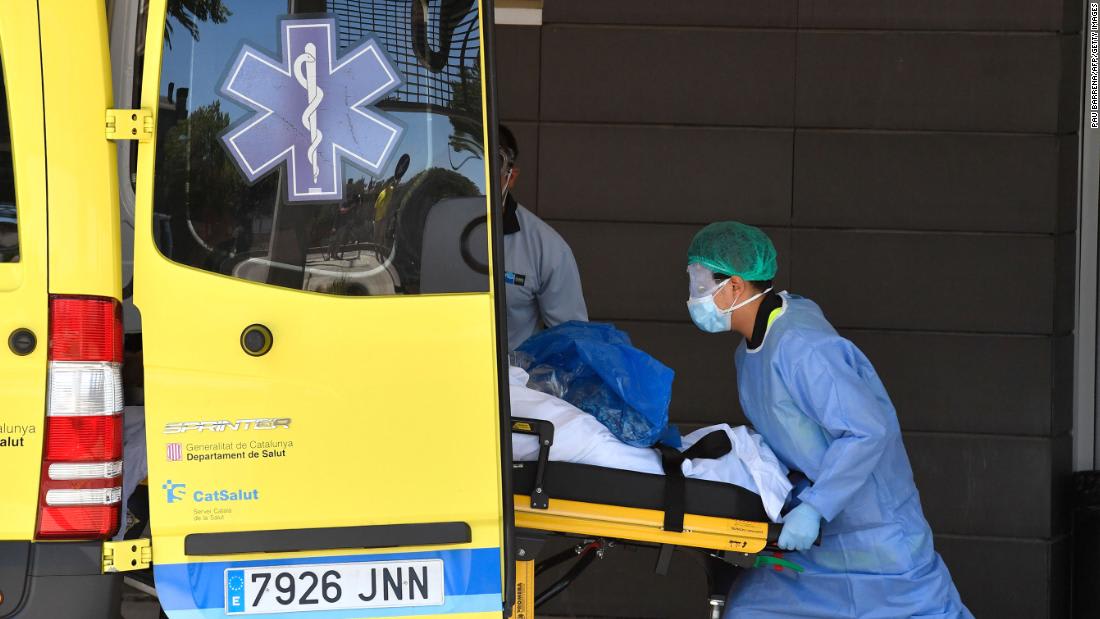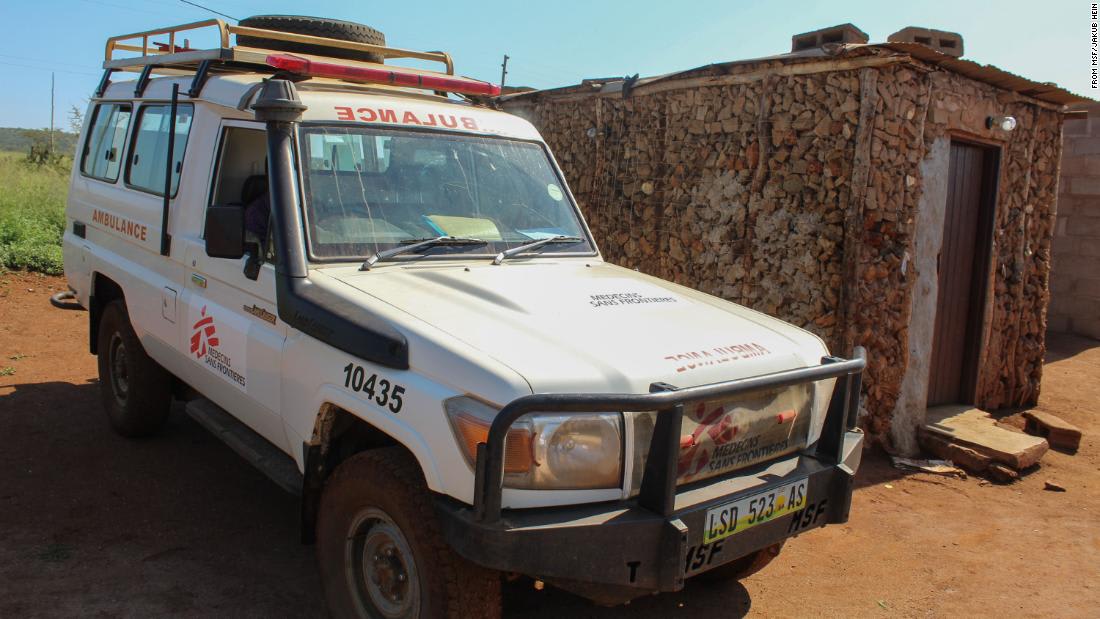It's Monday morning on the US East Coast. Here's the latest on the coronavirus pandemic.
The US marked Fourth of July over the weekend, and while some areas saw both measured celebrations in the wake of the coronavirus pandemic other places were packed with crowds.
Here's what you need to know about the virus this Monday:
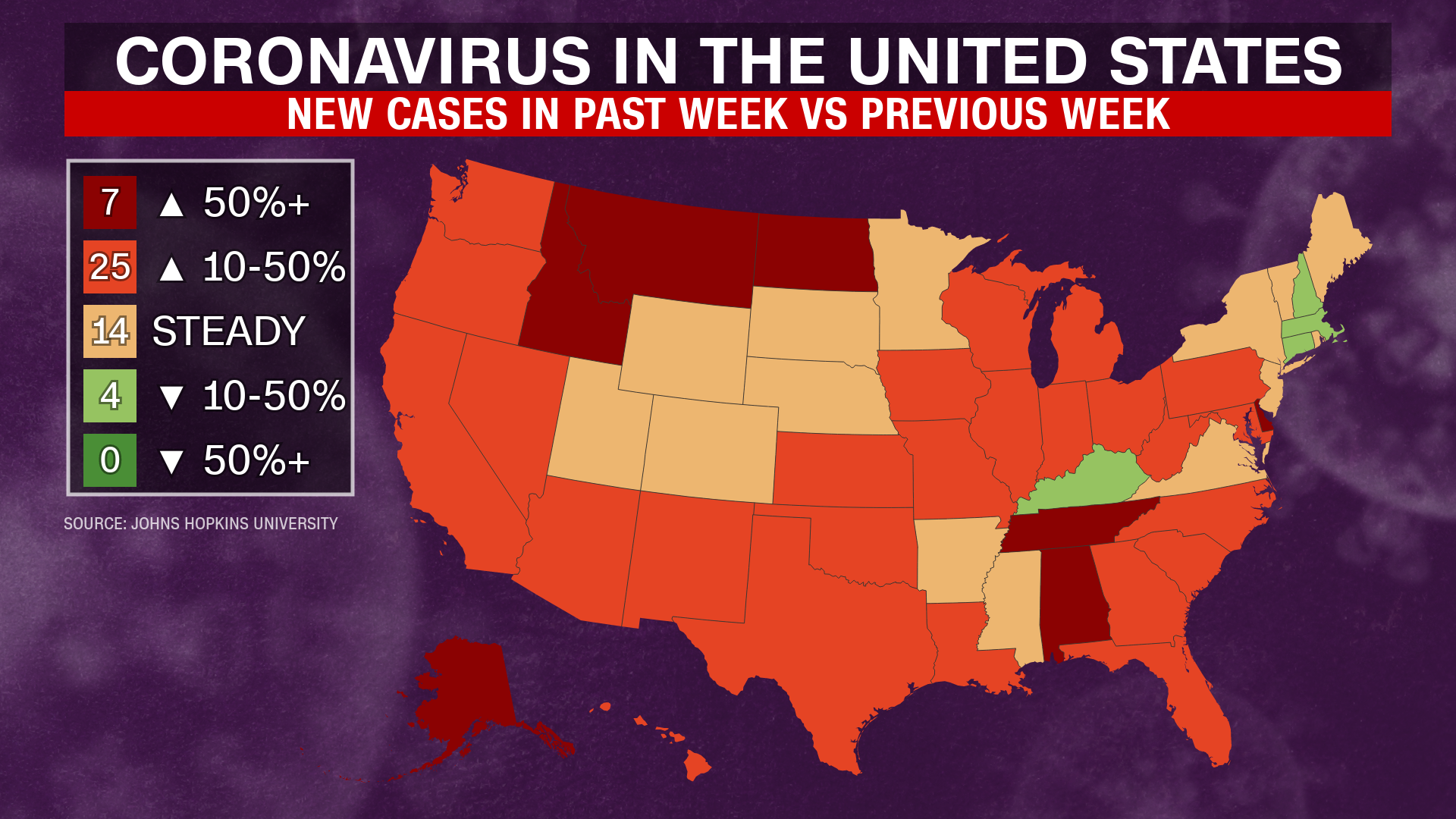
New York City enters phase 3 today without indoor dining
From CNN's Kristina Sgueglia
New York City enters phase three of its Covid-19 reopening today. In a news release yesterday, the governor reiterated that indoor dining will not be a part of this reopening.
The governor urged everyone in the state to wear a mask, socially distance, use hand sanitizer and "continue the smart practices that have made our state a national leader in combatting this virus."
"I also remind local governments of their duty to enforce the standards that have made NY's reopening safe and successful," Cuomo said in the statement.
Phase three of reopening allows sports and recreation to resume, including city basketball courts, tennis courts, volleyball, dog runs, handball and bocce, according to the city's mayor.
Latest state numbers: New York added 533 cases Saturday, with .84 percent positivity rate. The state reported 8 deaths.
International flights will resume in Kenya next month as part of phased reopening
From CNN's Bethlehem Feleke
Kenya will begin a phased reopening of the country by lifting a travel ban in and out of the capital Nairobi and the coastal city of Mombasa starting tomorrow, President Uhuru Kenyatta announced in a televised address Monday.
Domestic air travel will resume starting on July 15, while international travel in and out of Kenya is set to resume Aug. 1.
Places of worship will be allowed to re-open with a strict maximum capacity of 100 congregants for ceremonies of up to one hour.
The daily national dusk-to-dawn curfew has been extended for another 30 days, until Aug. 5, Kenyatta said.
The latest numbers: On Saturday, Kenya registered its highest single-day caseload with 389 new cases reported, according to the country's Ministry of Health.
Despite an increase of reported infections in recent days, Kenyatta assured "we have reached a reasonable level of preparedness across the country to allow us to re-open."
So far, Kenya has 7,886 confirmed cases and 160 deaths, according to the Ministry of Health.
"Should the situation deteriorate and pose a challenge to our health infrastructure, it shall be clawed back," Kenyatta said about the phased re-opening.
Covid-19 antibody drug moves into phase 3 trials, 2,000 US patients expected to enroll
From CNN Health’s Naomi Thomas
Late stage clinical trials of REGN-COV2, a combination antibody treatment for Covid-19 from Regeneron, have begun, according to a news release from the company today.
The phase three trials will be evaluating the ability of the drug to prevent infection among uninfected people who have had close contact to an infected person, such as a patient’s housemate.
The prevention trial is happening at around 100 sites and is expected to include 2,000 US patients.
The drug has also moved into the phase two/three portion of two trials testing its ability to treat hospitalized and non-hospitalized patients with Covid-19. These trials will involve 1,850 hospitalized patients and 1,050 non-hospitalized patients, and they are expected to be conducted at 150 sites in the United States, Brazil, Mexico and Chile.
The trials are being jointly run with the National Institute of Allergy and Infectious Diseases, part of the National Institutes of Health.
Masks and social distancing to be part of 2020 Hajj season
From CNN’s Nada AlTaher in Abu Dhabi
 A handful of worshippers are seen praying at the Ka’aba, Islam's holiest shrine, at the Grand Mosque complex in Mecca, Saudi Arabia, on June 23. Stringer/AFP/Getty Images
A handful of worshippers are seen praying at the Ka’aba, Islam's holiest shrine, at the Grand Mosque complex in Mecca, Saudi Arabia, on June 23. Stringer/AFP/Getty ImagesPilgrims seeking to perform Hajj this year will have to wear masks and observe social distancing rules at all times, under measures imposed by Saudi Arabia, state media reported Monday.
Under the restrictions, pilgrims must remain at least 1.5 meters apart, including during the ritual circling of the Ka'aba known as tawaf. Crowding and pushing will be prohibited, Saudi’s official news agency (SPA) said.
The kingdom is barring entry to holy sites including Mina, Mozdalefah and Arafat to those without a permit some 10 days before Hajj officially begins and until the Hajj season ends on August 2, according to SPA.
Congregational prayers will be performed while worshippers wear masks and practice social distancing; a contrast to how these prayers are normally carried out in accordance with Islamic rites.
Health checks will be carried out at bus stops, places of residence, and other vital areas, with medical teams available on stand-by around the clock, SPA said.
On Sunday, Saudi Arabia reported 3,580 new cases of coronavirus and 58 deaths in 24 hours, bringing its total number to 209,509 cases and its death toll to 1,916.
Spain's coronavirus antibodies study adds evidence against herd immunity
From CNN's Al Goodman
Spain's large-scale coronavirus study indicates that just 5% of its population has developed antibodies, strengthening evidence that a so-called herd immunity to Covid-19 is "unachievable," medical journal the Lancet reported on Monday.
The findings show that 95% of Spain's population remains susceptible to the virus.
Herd immunity is achieved when enough of a population has become infected with a virus or bacteria -- or vaccinated against it -- to stop its circulation.
The European Center for Disease Control told CNN that Spain's research, on a nationwide representative sample of more than 61,000 participants, appears to be the largest study to date among a dozen serological studies on the coronavirus undertaken by European nations.
It adds to the findings of an antibody study involving 2,766 participants in Geneva, Switzerland, published in the Lancet on June 11.
"In light of these findings, any proposed approach to achieve herd immunity through natural infection is not only highly unethical, but also unachievable," said the Lancet's commentary authors, Isabella Eckerle, head of the Geneva Centre for Emerging Viral Diseases, and Benjamin Meyer, a virologist at the University of Geneva.
Doctors are uncertain whether having antibodies to the coronavirus means someone cannot be infected again. It's not clear how long or how well antibodies protect people from the virus.
Spain's peer-reviewed study began in April while the nation remained on a strict lockdown, and was conducted by leading government research and epidemiological agencies.
Read the rest of the article here:
Peru surpasses 300,000 coronavirus cases
From CNN's Claudia Rebaza and Tim Lister in London, Maija Ehlinger in Atlanta, and Ingrid Formanek in Spain
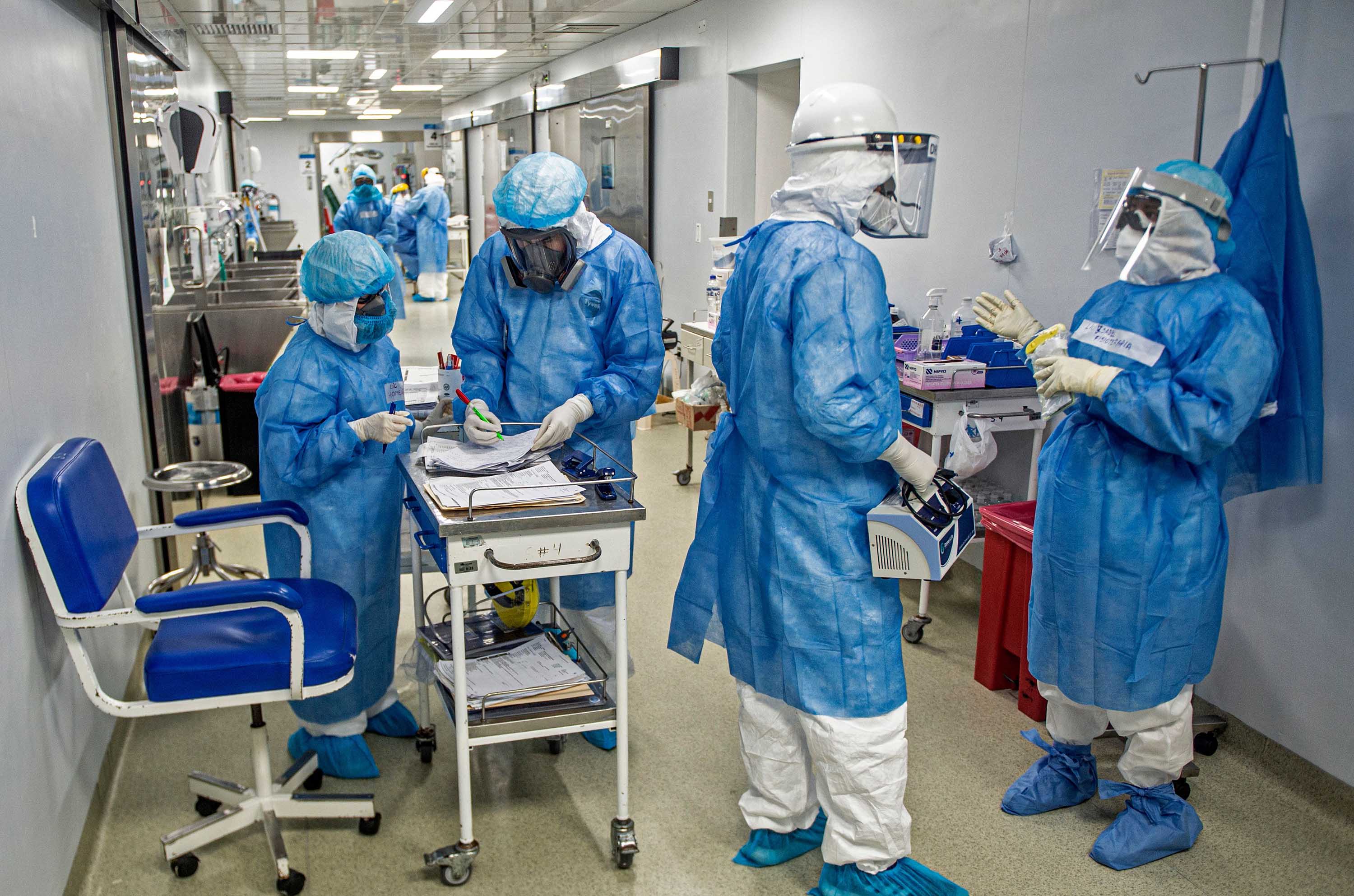 Health professionals are seen in the hall of the Intensive Care Unit of the Alberto Sabogal Sologuren Hospital, in Lima, Peru, on July 2. Ernesto Benavides/AFP/Getty Images
Health professionals are seen in the hall of the Intensive Care Unit of the Alberto Sabogal Sologuren Hospital, in Lima, Peru, on July 2. Ernesto Benavides/AFP/Getty ImagesPeru's Ministry of Health reported 3,635 new Covid-19 cases on Sunday, bringing the country's total to 302,718.
More than half of Peru's cases have been reported in the capital Lima, with 165,307 coronavirus cases to date. The Ministry of Health also confirmed 11,302 hospitalizations and 10,589 deaths across the country.
Over the past week, Peru has had a daily average of 3,328 Covid-19 infections and 183 deaths. The daily numbers have not shown much variation in the past two weeks.
The director of the Pan American Health Organization (PAHO), Dr Carissa Etienne, said last week that Peru is expected to see a peak in infections "at some point in August."
Peru is the second hardest-hit country by Covid-19 in Latin America -- behind Brazil, which has reported more than 1,600,000 total cases.
Coronavirus lockdowns could cause 1 million extra deaths from other diseases, experts warn
From CNN's Meera Senthilingam
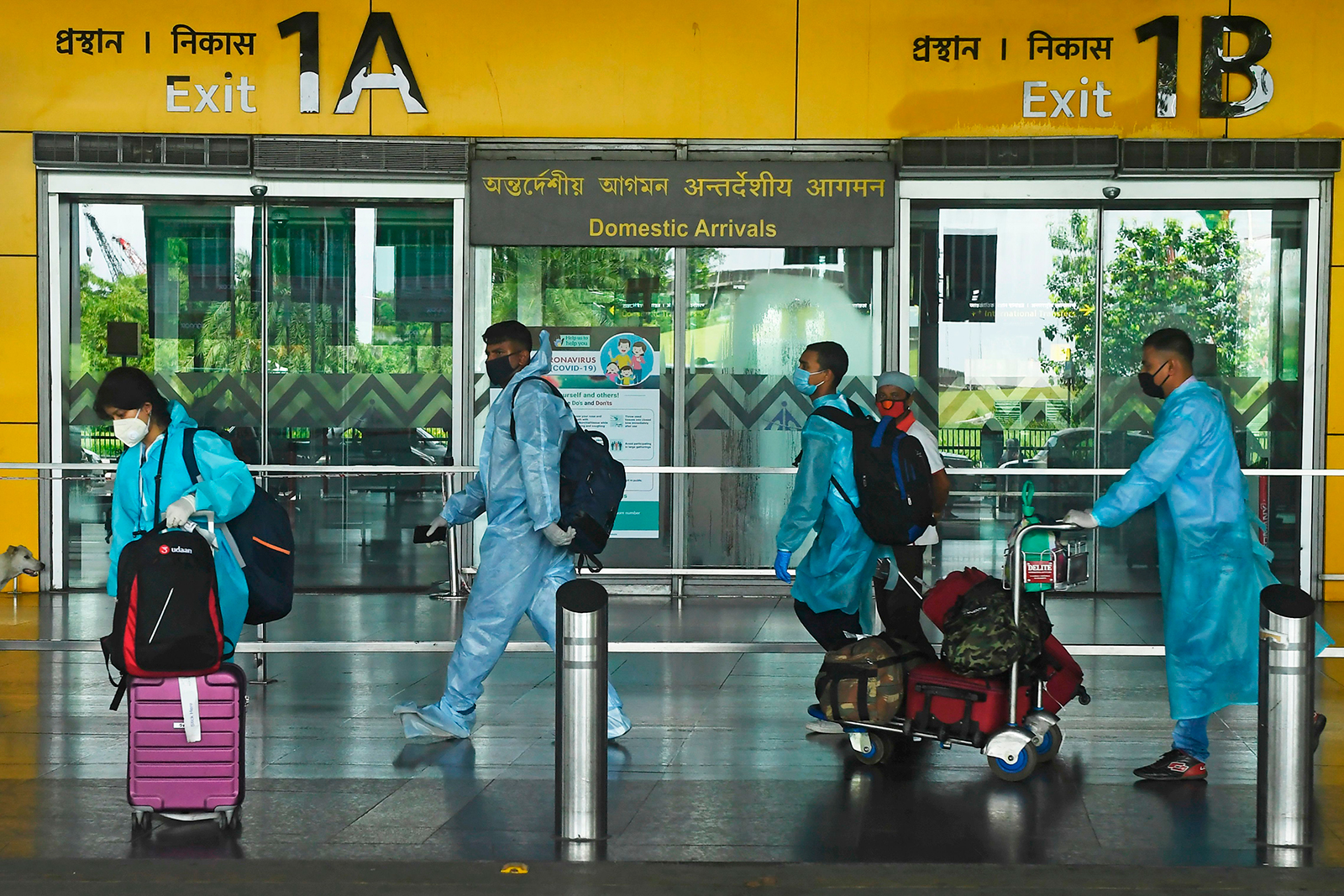 Air passengers wearing protective suits at Netaji Subhas Chandra Bose International Airport in Kolkata, India on July 6. Dibyangshu Sarkar/AFP/Getty Images
Air passengers wearing protective suits at Netaji Subhas Chandra Bose International Airport in Kolkata, India on July 6. Dibyangshu Sarkar/AFP/Getty ImagesAs health services around the world continue to focus resources on ending the coronavirus pandemic, they threaten to derail decades of hard-won progress tackling diseases like HIV and tuberculosis, according to a new report by the International AIDS Society.
The society plans to raise its concerns during the 23rd International AIDS conference, which began Monday.
"The social distancing efforts and lockdowns to control the spread of it [coronavirus], have disrupted HIV prevention and treatment programs and put vital HIV research on hold," said Dr. Anton Pozniak, president of the International AIDS Society, last week.
A survey released in June by the NGO Global Fund To Fight AIDS, Tuberculosis and Malaria found that across 106 of the countries it works in, 85% had reported disruptions to their HIV services, 78% to tuberculosis services, and 73% to malaria services. Nearly 20% reported severe disruptions for all three diseases.
For example, recent models commissioned by the World Health Organization and Joint United Nations Programme on HIV and AIDS (UNAIDS) estimated that a six-month disruption to services in sub-Saharan Africa alone could lead to an extra 500,000 deaths from AIDS-related illnesses in 2021. This is on top of a likely 470,000 deaths that would have occurred, based on 2018 numbers.
Read more here:
UK government announces nearly $2 billion emergency arts support fund
From Sharon Braithwaite in London
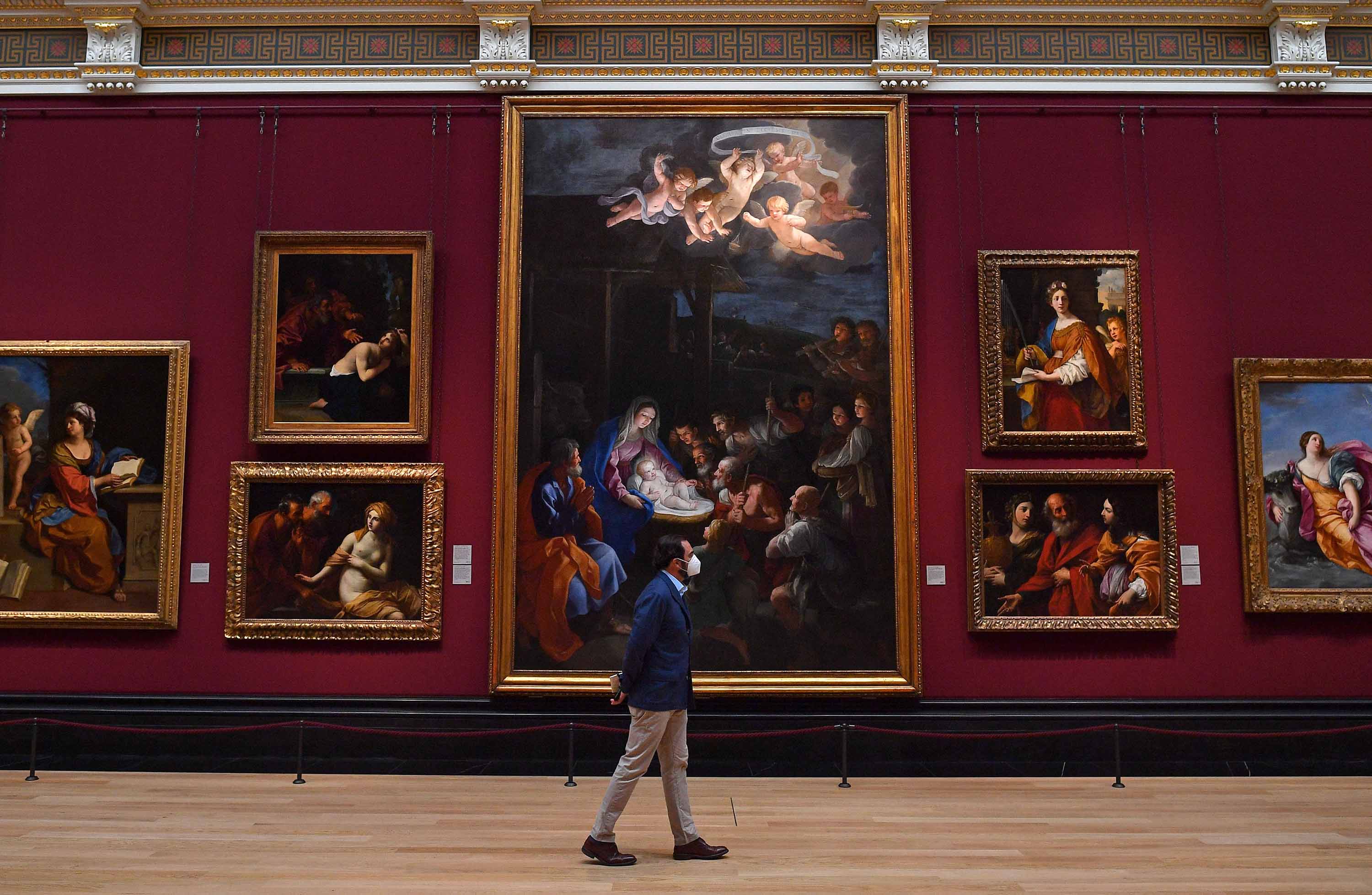 A member of staff wearing a protective face mask patrols a room inside the National Gallery in London on July 4, as the gallery prepares to reopen on July 8, following the easing of restrictions imposed during the novel coronavirus pandemic. Justin Tallis/AFP/Getty Images
A member of staff wearing a protective face mask patrols a room inside the National Gallery in London on July 4, as the gallery prepares to reopen on July 8, following the easing of restrictions imposed during the novel coronavirus pandemic. Justin Tallis/AFP/Getty ImagesUK cultural and heritage organizations will receive a £1.57 billion ($1.96 billion) support package "to help weather the impact of coronavirus," the government announced late Sunday.
Britain's museums, galleries, theatres, independent cinemas, heritage sites and music venues have been closed since the end of March, when the country's lockdown began.
The emergency fund will help cultural and heritage institutions "stay afloat while their doors are closed. Funding to restart paused projects will also help support employment, including freelancers working in these sectors," the government said.
"This money will help safeguard the sector for future generations, ensuring arts groups and venues across the UK can stay afloat and support their staff whilst their doors remain closed and curtains remain down."

 5 years ago
613
5 years ago
613 